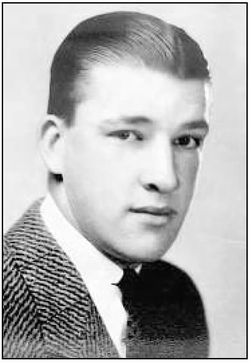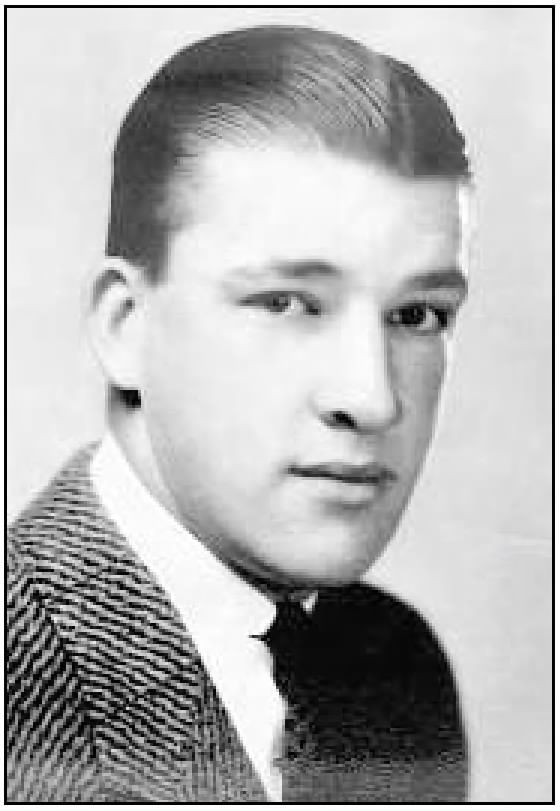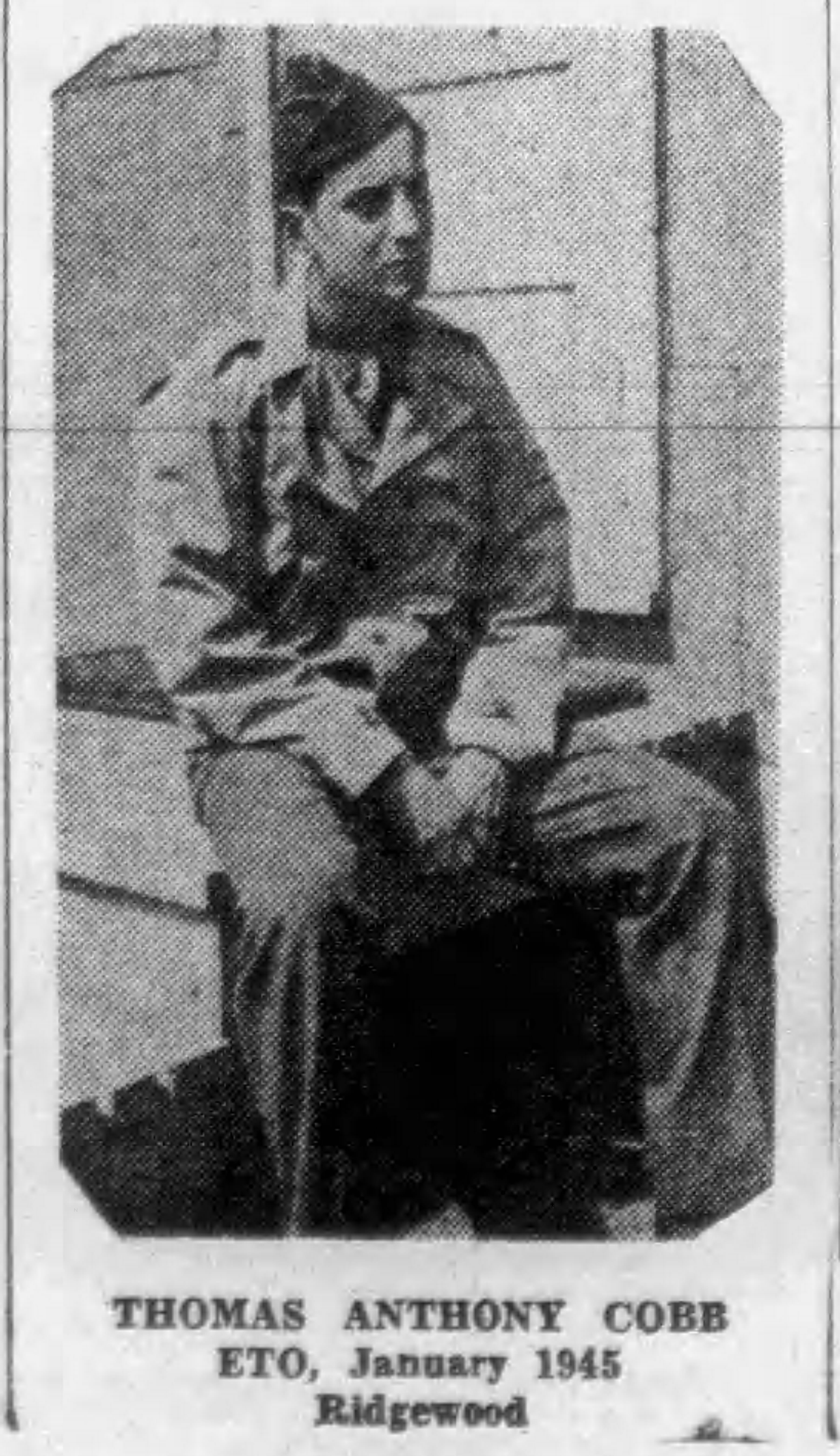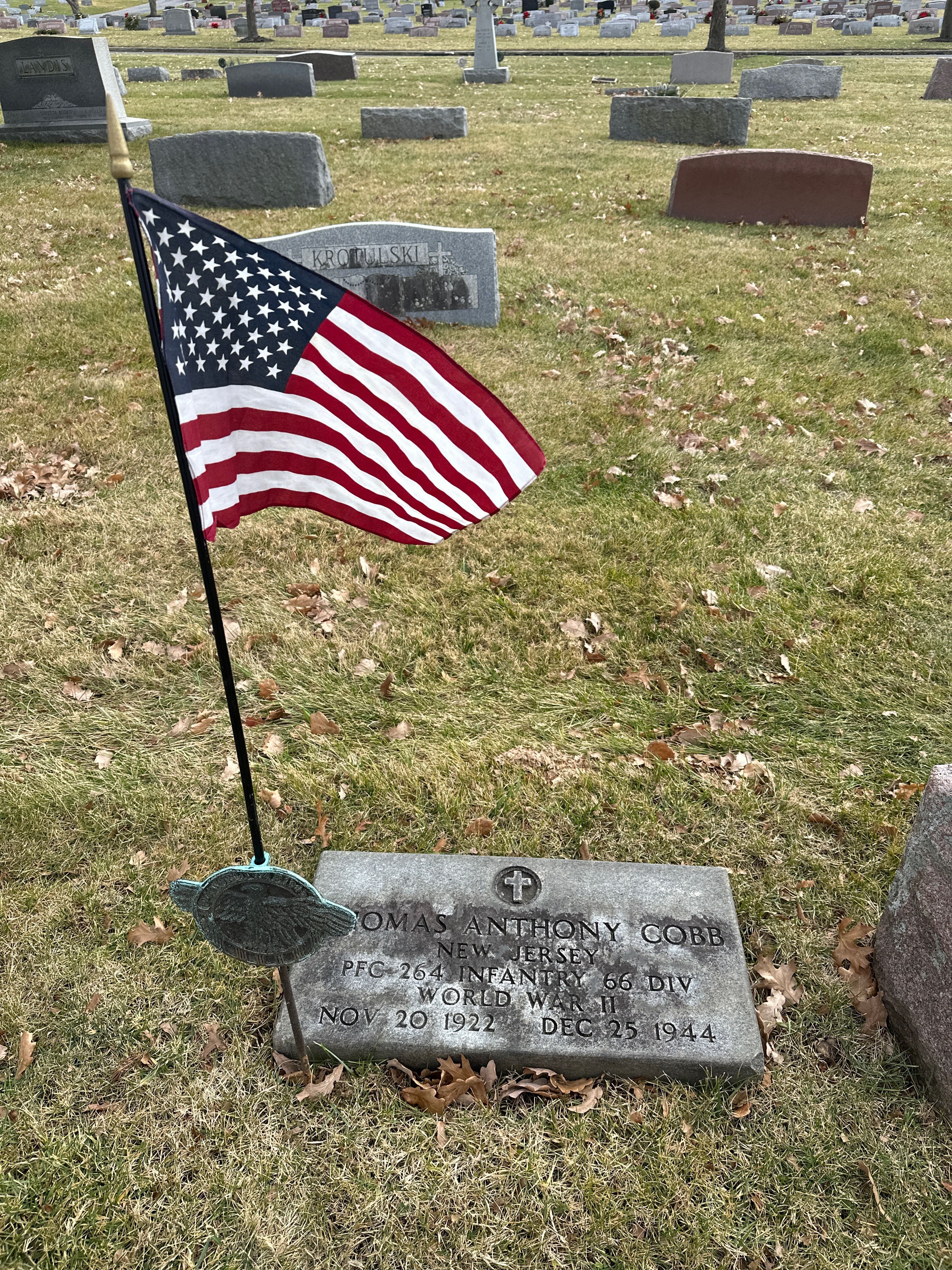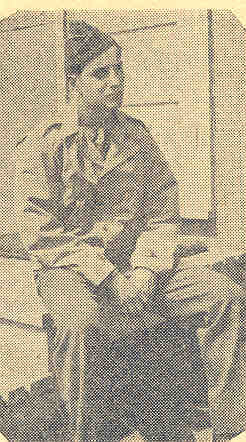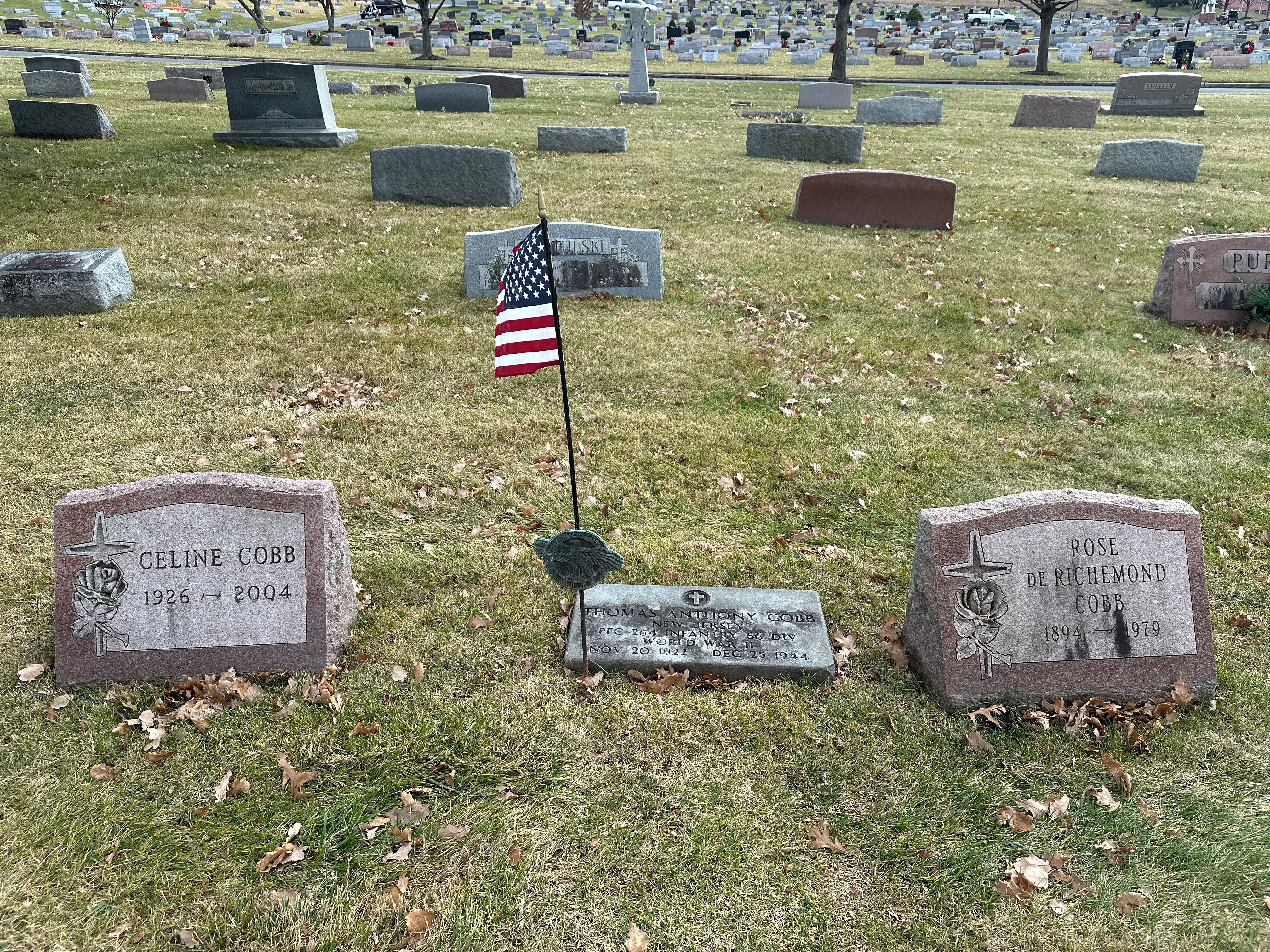Tom was born in Reading, Pa. November 22, 1922 and lived in Ridgewood with his sister, brother and his widowed mother. He attended Mount Carmel Church and graduated from St. Luke's school in Hohokus in 1941. While at St. Luke's he was in the Boy's Athletic Association, the Boy's Glee Club and the Safety Patrol. He was also ad manager for the year book the "Pindarian".
Upon graduation, he worked at the Wright Aeronautical Corp. in Paterson before enlisting in January 1943. He did his basic training at Camp Phillips in Kansas and attended the University of Nebraska Engineering School on the Army Special Training Program, finishing in the top 10% of his class. When the ASTP was disbanded, he was assigned to Infantry School at Camp Rucker, Alabama. His letters home from that time clearly indicated that he was extremely unhappy to find himself in the infantry. In one letter he tells his mother "I dream of the time I can sit at home and not worry about what's going to happen next."
He went overseas in November 1944 and died when the troopship Leopoldville, a pre-war Belgian ocean liner taken into service by the British Navy at the outbreak of the war, was torpedoed by a German submarine while most of the soldiers slept.
On December 24, 1944, the Leopoldville was transporting 2,235 American soldiers across the English Channel as reinforcements for the Battle of the Bulge. The Leopoldville was protected by escort ships, including the British Destroyer Brilliant, but no air cover was made available even though the threat of attack by German submarines was high. Just five and one half miles from its destination of Cherbourg, France, the vessel was torpedoed in the number 4 hold by U-486 and sank 2 1/2 hours later.
The British Commander in charge of the convoy ordered the Leopoldville's anchor dropped to prevent the troopship from drifting into a minefield outside the harbor. When a tug arrived on the scene, it couldn't tow the sinking vessel because of the dropped anchor. According to many survivors, the order to abandon ship was given in Flemish and the Belgian crew abandoned the sinking ship leaving the American soldiers to fend for themselves. No life jackets had been issued. Delayed radio transmissions for help, delayed response of rescue craft, heavy seas and freezing temperatures were just a few of the many things that sealed the soldiers' fates. And it being Christmas Eve, serviceman at an American base in Cherbourg who could have aided the stricken Leopoldville were taking a night off from the war, either partying or attending church. No one seemed to be around to help.
Cobb stood by the rail of the sinking Leopoldville with a friend who told him to be sure not to hit the side of the ship when their turn came to jump to Brilliant, alongside to off-load the soldiers. He told his friend "visit my family for me because I'm not coming back". By the time their turn came to jump, his friend made it successfully to the Brilliant but could no longer find Cobb.
By the end the night, 763 American soldiers were dead (the official casualty count is sometimes given as 802), many drowning or freezing to death in the 48-degree waters of the English Channel. 493 of the bodies were never recovered. Three sets of brothers were killed, including two sets of twins. The survivors spent Christmas Day picking bodies out of the water.
Because of wartime censorship, and to cover-up the mistakes made by the various governments and officials involved, the disaster was not reported to the news media. Survivors were told by the British and American governments to keep quiet. Relatives of the victims were told that their loved ones were Missing in Action, even though the U.S. War Department knew them all to have perished. Later, the men were declared Killed in Action, but even then no details of their deaths were divulged to their families. After the war, the tragedy was considered an embarrassment to the Allies and all reports were filed away as secret by the American and British governments while families of victims searched vainly for information about the deaths of their loved ones. Only in 1996 - over 50 years later - did the British declassify documents relating to the sinking of the Leopoldville.
Cobb's body was recovered, buried in France and eventually repatriated to the USA and buried in Section CC, Lot 56, Grave 5 in Gethsemane Cemetery near Reading, Pa. At death he was 22 years old.
From book "At Death He was 25 Years Old" By Christopher C. Stout (F.A.G. contributor #48289027)
Tom was born in Reading, Pa. November 22, 1922 and lived in Ridgewood with his sister, brother and his widowed mother. He attended Mount Carmel Church and graduated from St. Luke's school in Hohokus in 1941. While at St. Luke's he was in the Boy's Athletic Association, the Boy's Glee Club and the Safety Patrol. He was also ad manager for the year book the "Pindarian".
Upon graduation, he worked at the Wright Aeronautical Corp. in Paterson before enlisting in January 1943. He did his basic training at Camp Phillips in Kansas and attended the University of Nebraska Engineering School on the Army Special Training Program, finishing in the top 10% of his class. When the ASTP was disbanded, he was assigned to Infantry School at Camp Rucker, Alabama. His letters home from that time clearly indicated that he was extremely unhappy to find himself in the infantry. In one letter he tells his mother "I dream of the time I can sit at home and not worry about what's going to happen next."
He went overseas in November 1944 and died when the troopship Leopoldville, a pre-war Belgian ocean liner taken into service by the British Navy at the outbreak of the war, was torpedoed by a German submarine while most of the soldiers slept.
On December 24, 1944, the Leopoldville was transporting 2,235 American soldiers across the English Channel as reinforcements for the Battle of the Bulge. The Leopoldville was protected by escort ships, including the British Destroyer Brilliant, but no air cover was made available even though the threat of attack by German submarines was high. Just five and one half miles from its destination of Cherbourg, France, the vessel was torpedoed in the number 4 hold by U-486 and sank 2 1/2 hours later.
The British Commander in charge of the convoy ordered the Leopoldville's anchor dropped to prevent the troopship from drifting into a minefield outside the harbor. When a tug arrived on the scene, it couldn't tow the sinking vessel because of the dropped anchor. According to many survivors, the order to abandon ship was given in Flemish and the Belgian crew abandoned the sinking ship leaving the American soldiers to fend for themselves. No life jackets had been issued. Delayed radio transmissions for help, delayed response of rescue craft, heavy seas and freezing temperatures were just a few of the many things that sealed the soldiers' fates. And it being Christmas Eve, serviceman at an American base in Cherbourg who could have aided the stricken Leopoldville were taking a night off from the war, either partying or attending church. No one seemed to be around to help.
Cobb stood by the rail of the sinking Leopoldville with a friend who told him to be sure not to hit the side of the ship when their turn came to jump to Brilliant, alongside to off-load the soldiers. He told his friend "visit my family for me because I'm not coming back". By the time their turn came to jump, his friend made it successfully to the Brilliant but could no longer find Cobb.
By the end the night, 763 American soldiers were dead (the official casualty count is sometimes given as 802), many drowning or freezing to death in the 48-degree waters of the English Channel. 493 of the bodies were never recovered. Three sets of brothers were killed, including two sets of twins. The survivors spent Christmas Day picking bodies out of the water.
Because of wartime censorship, and to cover-up the mistakes made by the various governments and officials involved, the disaster was not reported to the news media. Survivors were told by the British and American governments to keep quiet. Relatives of the victims were told that their loved ones were Missing in Action, even though the U.S. War Department knew them all to have perished. Later, the men were declared Killed in Action, but even then no details of their deaths were divulged to their families. After the war, the tragedy was considered an embarrassment to the Allies and all reports were filed away as secret by the American and British governments while families of victims searched vainly for information about the deaths of their loved ones. Only in 1996 - over 50 years later - did the British declassify documents relating to the sinking of the Leopoldville.
Cobb's body was recovered, buried in France and eventually repatriated to the USA and buried in Section CC, Lot 56, Grave 5 in Gethsemane Cemetery near Reading, Pa. At death he was 22 years old.
From book "At Death He was 25 Years Old" By Christopher C. Stout (F.A.G. contributor #48289027)
Family Members
Other Records
Sponsored by Ancestry
Advertisement
Advertisement
